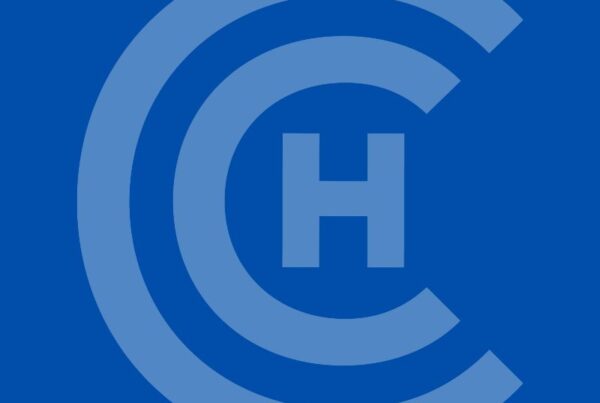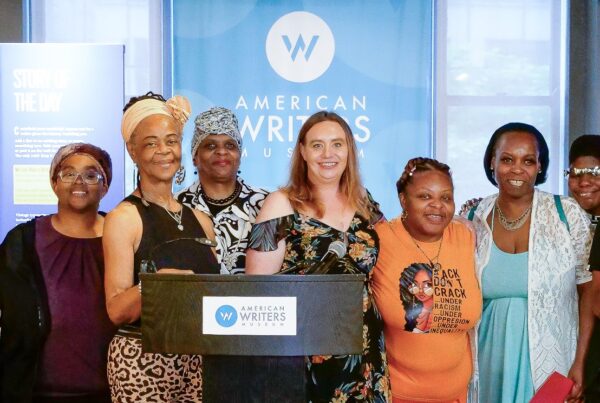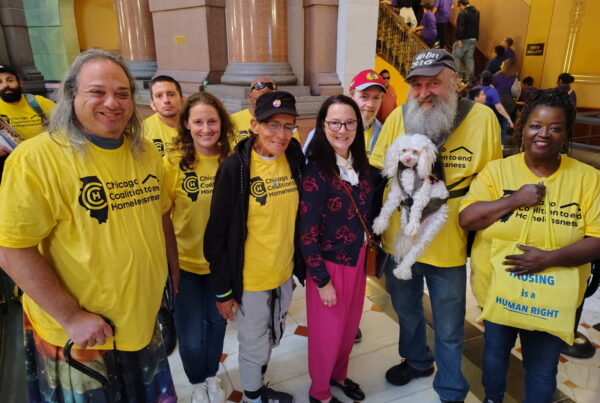By Diane O’Connell, Staff Attorney

Chicago Coalition for the Homeless filed suit Tuesday against the city of Chicago on behalf of Robert Henderson in what is believed to be a first test of the state’s Homeless Bill of Rights. | Photo by Mark Brown/Sun-Times
The Law Project of the Chicago Coalition for the Homeless has secured a significant settlement on behalf of our client, Robert Henderson, in the first substantive case filed under the Illinois Bill of Rights for the Homeless Act. It was a proud moment for us, and a victory for the rights of people who experience homelessness in Chicago.
Illinois was the second state in the U.S. to adopt a Homeless Bill of Rights, enacted in 2013 after advocacy by CCH. A legal intern at the time, I remember the day that Gov. Pat Quinn came to CCH’s office to sign the act into law.
Two years later and now an attorney, I was standing by a West Side viaduct at Oakley and Kinzie speaking with Robert. He called our office because city workers had come through the viaduct and thrown away everything he owned into a garbage truck. Among the belongings the city seized and destroyed were his medications, obituaries of loved ones, and a Bible given to him by a minister to his family. Using abusive language, a city worker told Robert, a man in his 60s, to go find somewhere else to live.
After meeting Robert, we secured a law firm to co-counsel in representing him. Assisted by the talented lawyers at Hughes Socol Piers Resnick & Dym, Ltd. (HSPRD), we filed the case in court in March 2016, steering it through the next two years of litigation. Chicago Sun-Times columnist Mark Brown also wrote about Robert.
Six months later we defeated the city’s motion to dismiss the case, an early victory that indicated that the city should be taking the Illinois Homeless Bill of Rights seriously.
Attorney Kate Schwartz of HSPRD, who argued in opposition to the city’s motion for dismissal, explained, “The win was significant because the court rejected the city’s incredibly narrow interpretation of the homeless act. While the city insisted that the act only supports a cause of action for discrimination based solely on housing status, the court interpreted the law to provide homeless individuals broad protection, regardless of intent.”
Later, we won a motion to dismiss filed on behalf of individual defendants. Finally, a few weeks before the case was set for trial, we reached a favorable settlement for Robert that includes monetary damages, attorneys’ fees, and costs.
For Robert, the case was not just about compensation. It was about vindication. In his words, “This case was about the way the city treats their citizens. [Losing my belongings] means nothing to them, but it means everything to a homeless person.”
Thankfully, while the case was pending, Robert obtained permanent housing. After many years of homelessness, he has spent the past two winters safe and warm inside his own home.
But outside, Chicagoans who struggle with homelessness continue to deal with daily violations of their civil rights. CCH filed two more Homeless Bill of Rights cases in the past year, responding to the city’s actions in Uptown and in the Lower Wacker area, the latter case co-counseled with Hughes Socol. Both cases have distinct facts, but Robert’s serves as the foundation that informs our efforts.
For me, Robert’s case was an exercise in democracy: to have been part of the organization that worked to pass the Homeless Bill of Rights Act, then to have helped a client file the first complaint exercising his rights under it. It was a privilege to bear witness to Robert’s story and to stand next to him in court. More broadly, Robert’s case is important because it was a response to one of the many injustices experienced by homeless people in Chicago. It was one moment, under one viaduct, that didn’t go unanswered.






